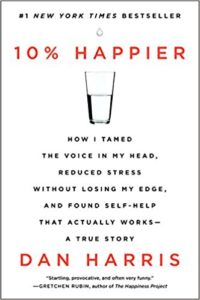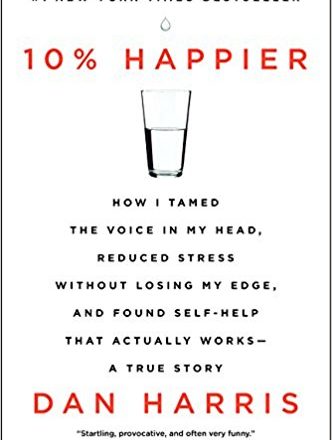Imagine a scenario where two people come up to you to advocate meditation. One is a bearded man wearing a beaded necklace over his flowing yoga robes. The other is a suit-wearing news anchor for Good Morning America. Who seems more likely to be unbiased about the positives and negatives of meditation?
And yes, I’m starting a book review by asking the reader to judge a book by its cover.
It is that news anchor respectability that makes Harris’ proselytizing on meditation that much more effective. Harris has spent his entire career in journalism, covering everything from Middle Eastern war zones to spirituality while working for various ABC News programs. The stress of his career led to him developing a drug addiction and having an on-air panic attack (twice!). His spirituality news coverage was always tempered with a healthy dose of skepticism for all religious and spiritual-based dogma.
All this makes what he has to say on the subject of meditation that much more powerful. He resists or has reluctance throughout his journey to practice meditation and never comes across as a starry-eyed convert. In fact, Harris appears much more skeptical than the societal average. He’s skeptical of mainstream spiritual icons such as Echart Tolle, Deepak Chopra and even the Dalai Lama. He’s skeptical when he goes on his first 10-day meditation retreat. He’s still skeptical after the retreat despite some personal epiphanies. The book presents his struggles with and benefits from meditation while making a case that it can help anyone.

“10% Happier” is a fitting title for this book, because Harris promises no panaceas, no miracle cures and remains dubious on the prospect of achieving the Buddhist ideal of enlightenment. Happiness in the book’s context is referring more to overall life-improvement and well-being than just happiness. And 10% is a purposefully modest goal that Harris has chosen, because who wouldn’t choose to be slightly happier in exchange for the relatively investment of meditation?
Had I read this book when it was initially released, my only complaint would have been that it does not adequately give the reader concrete steps in how to start their own practice. However, Harris has recently released Meditation for Fidgety Skeptics (there’s the skepticism again), in order to remedy this. And, to be fair, the instructional portion of a meditation practice is as basic as it gets. Sit comfortably, focus on your breath, return focus when it lapses. That’s it. But much like Michael Pollan’s seven words (“eat food, mostly plants, not too much”) much can be said about those three steps.
IFTTT: Meditation for Fidgety Skeptics, Waking Up by Sam Harris

